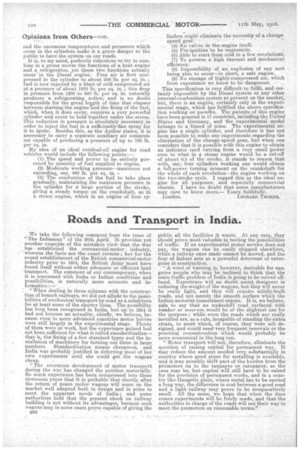Roads and Transport in India.
Page 18

If you've noticed an error in this article please click here to report it so we can fix it.
, We take the following comment from the issue of " The Indianian" of the 28th April. It provides yet another examPle of the mistaken view that the .war has established thecommercial-motor industry, whereas the facts are the exact reverse ; but for the sound establishment of the British commercial-motor industry prior to 1914, the British Army must have found itself without either adequate or efficient land transport. The comment of our contemporary, when it is concerned with India or Indian conditions and possibilities, is naturally more accurate and informative:—' : "When dealing in these-columns with the construc tion of branch railways, we did not allude to the possibilities of mechanical transport by road as a substitute for at least some of the shorter lines. The possibility has long been recognized in India, but up to 1914 it had not become an actuality, chiefly, we believe, because even in more advanced countries motor lorries Were still largely in the experimental stage. Plenty of them were 'at work, but the experience gained had not been sufficient for what is" calledstandardization—' that is, the fixing of a few. standard types and the installation of machinery for turning out these in large numbers. Standardization meanscheapness, and India was probably justified in deferring most of her own experiments until she could get the wagons cheap.
"The enormous development of motor transport during the war has changed the position materially. So much experience has been compressed into these strenuous years that it is probable that shortly, after the return of peace motor wagons will comeon the market well adapted both in design and in price to meet the apparent needs of India-; and some authorities hold that the present check on railway building is not without its advantages, because such wagons may.in some cases prove capable of giving the B58
public all the facilities it wants.any rate, they
should prove most valuable in tesing the possibilities of traffic; • If an experimental motor service does not pay, the wagons can be easily shipped elsewhere, while a railway once made cannot be moved, and the fear of 'failure acts as a powerful deterrent of enterprise in construction.
" A word Of warning ri, howeyer, desirable for sanguine people. who may be inclined to think that the main traffic problem of India is going to he solved offhand. Experience will no doubt assist designers in reducing the .weight of the wagons, but they will never b-e really light, and they will require solidly-built roads, and not-merely the smooth surface which the Indian motorist (sometimes) enjoys. It is, we believe, safe to say that no -makeshift road surfaced with . kvakar or moorxim. would be of the slightest use for the purpose ; -while even the roads which are really nietalled are, as a rule; incapable of standing the extra strain, to meet which, of course, they were not designed, and would need 'very frequent renewals or the practical reconstruction which would probably be more economical in the long run.
" Motor transport will not, therefore, eliminate the question of raising capital for permanent way. It .may reduce the amount needed very substantially in country where good stone for metalling is available, and it may possibly shift part of the burden from thp promoters on to the taxpayer or ratepayer, as the ca-se may be, but -capital will still have to be raised for the provision of permanent works, and in a country like Gangetic plain, where metaI has to be carried a long way, the difference in cost between a good road and a light railway may prove to be comparatively small. All thp same, we hope that 'when the time comes experiments will be freely made, arid that the authorities in charge of the roads will see their way to meet the promoters on reasonable terms."




















